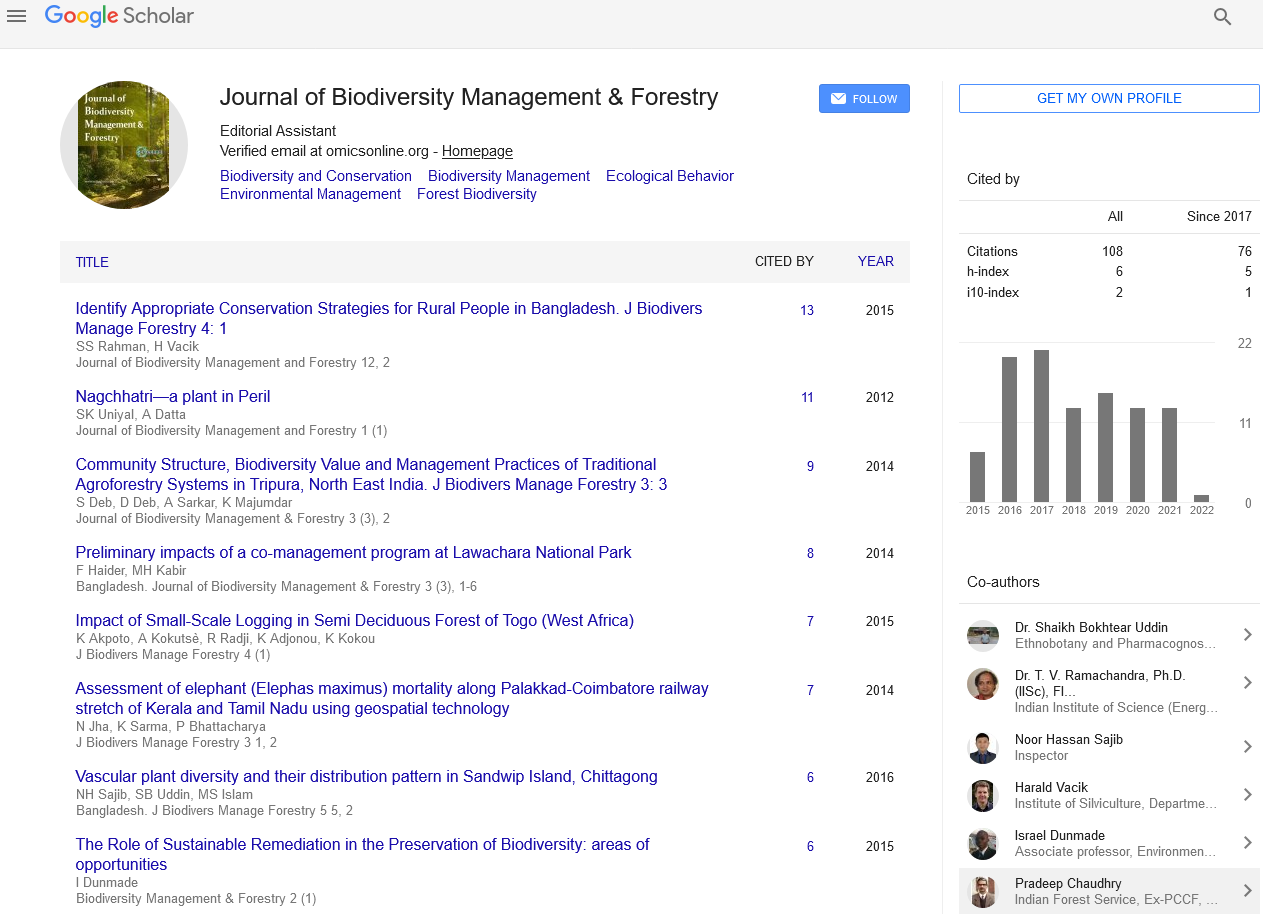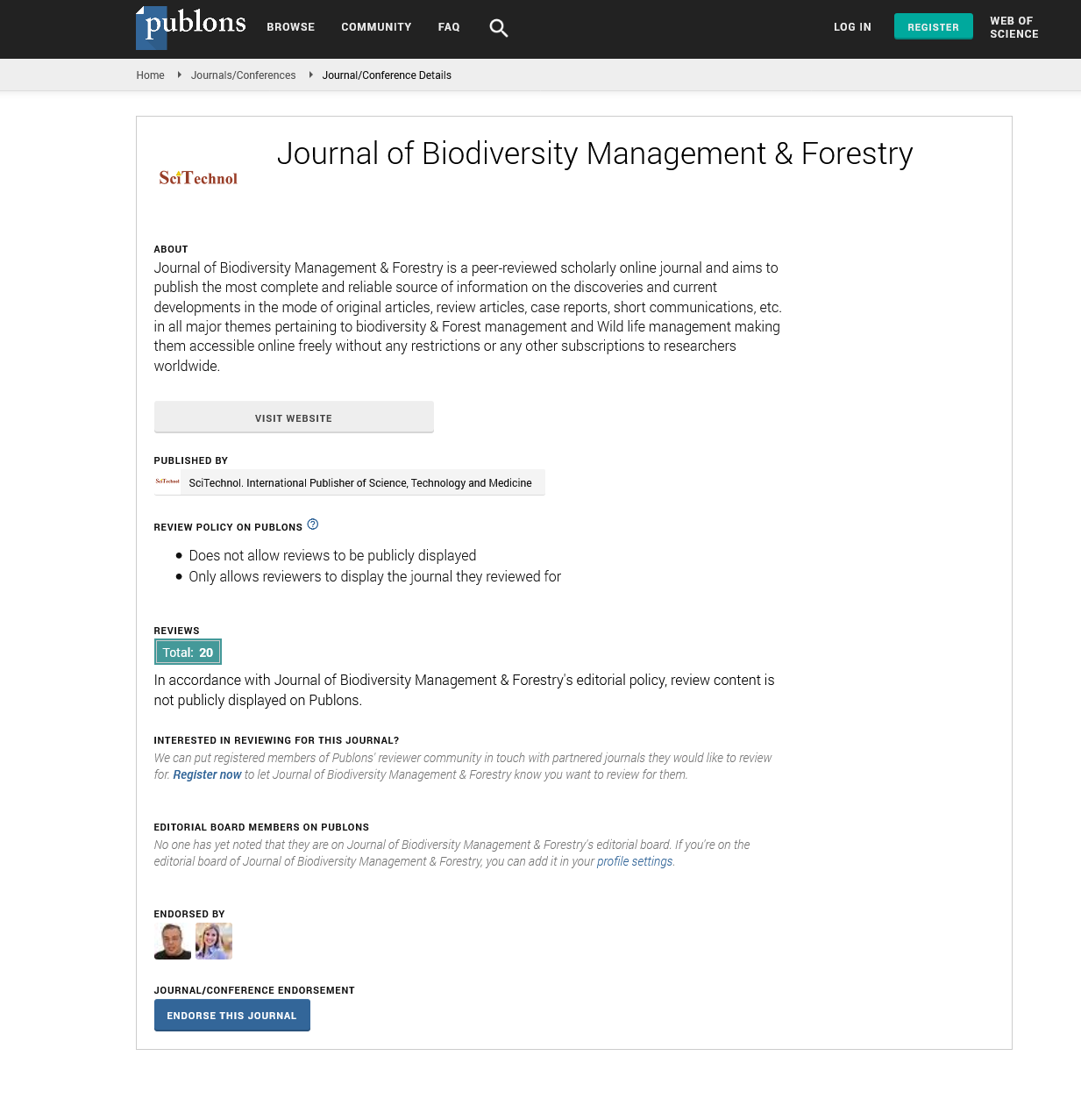Opinion Article, J Biodivers Manage Forestry Vol: 12 Issue: 1
Forest Management using Traditional Ecological Knowledge to Conserve Biodiversity
Rachel Nicole*
1Department of Planning and Landscape Architecture, University of Wisconsin, Madison, USA
*Corresponding Author: Rachel Nicole
Department of Planning and Landscape
Architecture, University of Wisconsin, Madison, USA;
E-mail: rachel@nic.org
Received date: 27 January, 2023, Manuscript No. JBMF-23-95518;
Editor assigned date: 30 January, 2023, Pre QC No. JBMF-23-95518(PQ);
Reviewed date: 15 February, 2023, QC No. JBMF-23-95518;
Revised date: 22 February, 2023, Manuscript No. JBMF-23-95518(R);
Published date: 28 February, 2023, DOI: 10.4172/jbmf 2327-4417.10023
Citation: Nicole R (2023) Forest Management Using Traditional Ecological Knowledge to Conserve Biodiversity. J Biodivers Manage Forestry 12:1.
Description
Integrating Traditional Ecological Knowledge (TEK) into forest management is a concept that recognizes the value and wisdom of Indigenous and local communities' traditional knowledge and practices in managing forests. TEK refers to the knowledge, skills, and practices that have been developed over generations through direct experience and interaction with the natural environment. It encompasses a holistic understanding of the relationships between ecosystems, biodiversity, cultural values, and human well-being. Integrating TEK into forest management approaches can contribute to more sustainable and resilient forest management practices that take into account local context, cultural diversity, and traditional practices alongside scientific approaches.One of the fundamental principles of integrating TEK into forest management is respect for the rights and culture of Indigenous and local communities. This includes recognizing their ownership and control over their traditional lands and resources, and involving them in decision-making processes related to forest management. It also involves acknowledging the spiritual, cultural, and social significance of forests to Indigenous and local communities, and respecting their traditional governance systems and customary laws.
Collaborative approaches are another key aspect of integrating TEK into forest management. This involves building meaningful partnerships and collaborations between Indigenous and local communities, forest managers, and other stakeholders. It requires producing spaces for dialogue, mutual learning, and sharing of knowledge and perspectives. Collaborative approaches can foster trust, understanding, and mutual respect among different knowledge holders, and can lead to more inclusive and effective forest management practices.
Recognition of diverse knowledge systems is important in integrating TEK into forest management. Indigenous and local communities have their own unique knowledge systems that are shaped by their culture, history, and local ecological context. TEK encompasses a wide range of knowledge, including ecological, cultural, social, and economic aspects. It recognizes the interconnectedness of different elements of the ecosystem and the ways in which they are intertwined with cultural practices and livelihoods. Integrating TEK requires acknowledging the diverse knowledge systems of different Indigenous and local communities and valuing their contributions to forest management.
Incorporation of traditional practices is a key element of integrating TEK into forest management. Many Indigenous and local communities have developed traditional practices and techniques for managing forests sustainably over generations. These practices may include agroforestry, controlled burning, rotational harvesting, and other techniques that are well-suited to local ecological conditions and cultural practices. Integrating these traditional practices into forest management approaches can contribute to sustainable resource use, biodiversity conservation, and ecosystem resilience.
Adaptive management is another important aspect of integrating TEK into forest management. TEK often includes traditional practices that are based on adaptive management approaches, which involve continuous observation, learning, and adjustment in response to changing environmental conditions. Traditional knowledge holders have developed strategies for coping with environmental variability and uncertainty over time. Integrating TEK may involve incorporating adaptive management strategies that allow for flexibility and learning from traditional practices, while also integrating scientific monitoring and assessment methods.
Co-learning and knowledge exchange are important in integrating TEK into forest management. This involves fostering mutual learning and knowledge exchange between traditional knowledge holders and forest managers. It requires developing opportunities for joint monitoring research, and learning initiatives that combine scientific and traditional knowledge. Co-learning can lead to a deeper understanding of the forest ecosystem and its dynamics, and can help identify effective management practices that integrate both traditional and scientific knowledge.
Legal and policy frameworks play an important role in integrating TEK into forest management. It may require developing or revising legal and policy frameworks that recognize and protect the rights and knowledge of Indigenous and local communities. This may include establishing mechanisms for informed consent, benefit-sharing, and intellectual property rights related to traditional knowledge. It also involves ensuring that forest management policies and practices are aligned with international human rights standards, including the United Nations Declaration on the Rights of Indigenous Peoples and other relevant conventions and agreements. The integration of TEK into forest management has numerous benefits.
 Spanish
Spanish  Chinese
Chinese  Russian
Russian  German
German  French
French  Japanese
Japanese  Portuguese
Portuguese  Hindi
Hindi 
